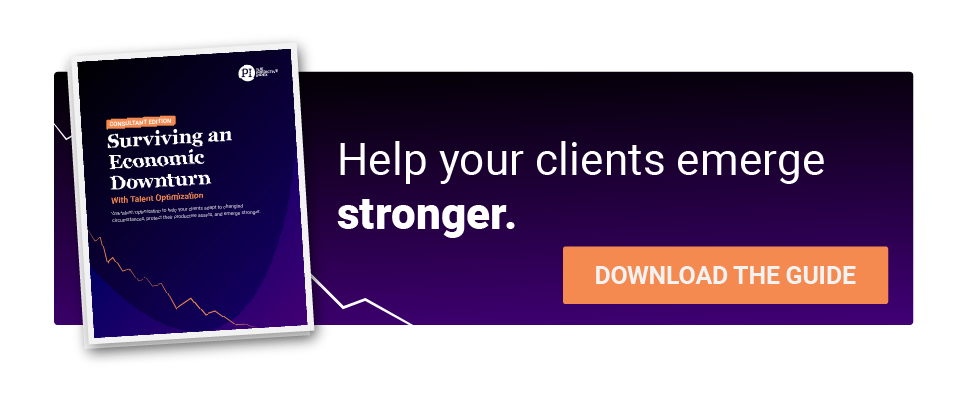COVID-19 has been challenging for all small businesses, and consultancies are no different. Within a matter of days, consultants went from being the most popular person on the call list to having radio silence.
As companies scramble to reduce spending, consultants find their calendar wiped clean. Due to stay-at-home mandates, they’re seeing their usual travel schedule halted. They’re left to navigate virtual engagements—yet still provide similar quality to in-person ones.
We know you want to support your clients during this difficult time. So we created a guide for you: Surviving an Economic Downturn With Talent Optimization.
Here are 10 of the guide’s biggest tips:
1) Encourage clients to take talent optimization one step at a time.
For clients rushing to put out fires and stabilize their business, talent optimization can be a daunting hill to climb.
During your engagements, position talent optimization as a series of surgical, highly-effective interventions. It’s easy to get overwhelmed with the entire discipline if tackled all at once. Instead, encourage your clients to take it one step at a time.
2) Have clients tailor their communication style to fit the org’s needs.
When disaster strikes, it’s important that clients have a clear communication plan in place. They’ll need to provide regular, candid updates to the rest of the organization.
Encourage your clients to tailor their communication style to the behavioral needs of each department. For example, finance or legal may require detail-heavy updates. Sales, by contrast, may prefer bigger-picture plans accompanied by a list of action items.
3) Appoint a fast-acting response team.
Clients should also form a crisis response team. This team will be responsible for making key decisions quickly. So it must be small enough to stay agile and fast-moving.
Consider that your clients likely want to act fast, but not rashly. You’ll want to recommend executives who are decisive, yet detailed enough to consider the data available before moving ahead.
4) Help clients adapt their business strategy.
Your clients will likely need to adapt their strategy to meet the evolving needs of the organization.
Start a dialogue among the key decision-makers. Work to determine which strategic priorities still make sense in light of the downturn. Likewise, help them decide where they should refocus their efforts.

5) Take the role of a mentor and guide.
Tensions can run high during a crisis. This is your chance to facilitate and provide your clients with data and facts.
Position yourself as a mentor and guide. You’re there to help your clients align on strategy, make tough workforce decisions, and emerge from the storm stronger. In a time when emotion and finger-pointing can derail good intentions, help keep clients on the right track.
6) Encourage clients to develop self-aware managers.
For clients to make it through this crisis, they need resilient leaders. And this resilience stems largely from being self-aware.
Clients should encourage managers to tailor their leadership to employees’ behavioral needs. Using a tool like PI Inspire, you can help managers visualize how their behavioral makeup compliments that of their team. In doing so, managers can have the confidence needed to lead through times of uncertainty.
7) Use behavioral data to help restore high-performing teams.
You can also use behavioral data to help clients uncover areas where team performance has faltered.
Take a team of highly dominant go-getters. The group likely has no shortage of opinions or ideas. But they also run the risk of talking past one another—and failing to come to a consensus. To fill this communication gap, you could recommend that clients add more reflective thinkers to the team.
8) Understand how remote work affects existing team dynamics.
Some teams perform well in an office setting but struggle doing remote work. You could have a team of outgoing collaborators that work well in person, yet lack the same energy in this new virtual setting.
Using team analytics tools like PI Team Work Styles, you can shed light on existing team dynamics. That way, you can quickly assess the state of these teams, determine where communication has failed, and provide clients with actionable solutions.
9) Diagnose the pains facing client organizations.
During a crisis scenario, employee engagement will likely take a hit. If your clients don’t have a way to measure disengagement, it becomes all the harder to actually solve it.
Using an engagement tool like the PI Employee Experience Survey™, you can help your clients pinpoint where there is the most pain and friction within the organization. From there, you can help them focus their efforts and resources to addressing these areas.
10) Fill organizational gaps by having clients hire from within.
Hiring may have slowed, but as clients restructure, new roles will inevitably open up. Thankfully, you can help them hire from within to fill the need.
When hiring from within, clients should act as if they’re hiring externally. Stakeholders must first determine the role’s requirements. Then, they determine the appropriate behavioral and cognitive benchmarks. From there, they select candidates who best fit the job target.
Be there for your clients in their time of need.
When so much is uncertain, take time to protect what you have. This isn’t a time to scale and grow; it’s a time to focus on client retention.
Throughout these difficult times, try to remain flexible. Seek to help your clients in any way, even if it doesn’t fall into your typical book of services. Clients will appreciate the work you do now to support them during this time. And, they’ll remember the gesture for years to come.




